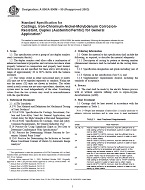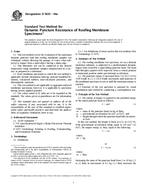1.1 These test methods cover physical and electrical tests for solid filling and treating compounds used for electrical insulation which are fusible to a liquid without significant chemical reaction. Compounds that are converted to the solid state by polymerization, condensation, or other chemical reaction are not included in these test methods.
1.2 These test methods are designed primarily for asphaltic or bituminous compounds, waxes, and fusible resins, or mixtures thereof, although some of these methods are applicable to semisolid types such as petrolatums. Special methods more suitable for hydrocarbon waxes are contained in Test Methods D1168.
1.3 Adequate ventilation must be provided when these tests involve heating.
1.4 The test methods appear in the following sections:
| Test Method | Sections |
| Electrical Tests: | |
| A-C Loss Characteristics and Permittivity (Dielectric Constant) | 51-54 |
| Dielectric Strength | 42-45 |
| Volume Resistivity-Temperature Characteristics | 46-49 |
| Physical Tests: | |
| Coefficient of Expansion or Contraction | 22-41 |
| Flash and Fire Points | 9 and 10 |
| Loss on Heating | 11 and 12 |
| Melting Point | 5 and 6 |
| Penetration | 15 and 16 |
| Softening Point | 7 and 8 |
| Specific Gravity | 17-21 |
| Viscosity | 13 and 14 |
1.5 The values stated in SI units are to be regarded as the standard. The values given in parentheses are for information only.
1.6 This standard does not purport to address all of the safety concerns, if any, associated with its use. It is the responsibility of the user of this standard to establish appropriate safety and health practices and determine the applicability of regulatory limitations prior to use. For specific hazard statements, see Note 4 and Note 7.
Note 1–There is no similar or equivalent IEC or ISO standard.
Product Details
- Published:
- 01/01/1996
- Number of Pages:
- 10
- File Size:
- 1 file , 89 KB


